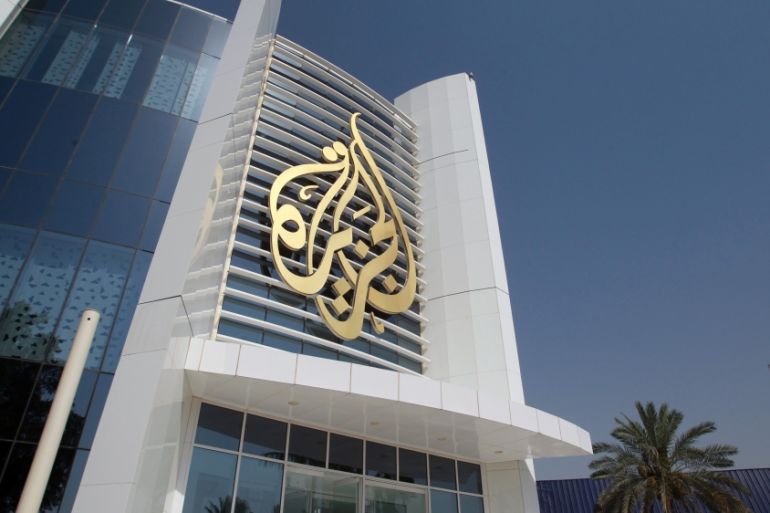Twitter deletes Saudi journalist’s call for bombing of Al Jazeera
In a series of now-removed posts, Khaled al-Matrafi said Al Jazeera was ‘legitimate target’ for Saudi-UAE-led coalition.

Twitter has deleted a series of tweets posted by Saudi journalist Khaled al-Matrafi, in which he called for the bombing of the Al Jazeera headquarters in Qatar’s capital.
Following a complaint by the Doha-based media network, Twitter’s management on Friday removed al-Matrafi’s posts which violated the social network’s rules and policies.
Keep reading
list of 4 itemsChildren of the Darien Gap
‘If you’re watching this, Al Jazeera has been banned in Israel’
Netanyahu gov’t votes to shut Al Jazeera in Israel
According to its policies, Twitter does not tolerate violent posts that threaten the lives of innocent people, and any account promoting incitement will be immediately and permanently suspended. Al-Matrafi’s account has not been suspended.
In a series of tweets published on Thursday, al-Matrafi wrote: “The Arab coalition has the right, in accordance with international law, not only to target the rocket launchers that targeted Abha airport, but also those who gave the order or backed the attack financially or gave them media support.”
Al-Matrafi was referring to an attack by Yemen’s Houthi rebels on Saudi Arabia’s Abha airport on Wednesday, which wounded 26 people. The Houthis have been engaged in a war with a Saudi-UAE-led coalition since March 2015.
“This means that the Al Jazeera channel in Qatar could be a legitimate target for the coalition for supporting such a terrorist act,” al-Matrafi wrote, who is known for his controversial Twitter posts.

In another tweet, al-Matrafi reiterated his call for the targeting of Al Jazeera.
“International law has given the coalition the ability to respond to the targeting of Abha airport on several fronts, and this does not only concern the Houthi group,” he wrote.
“There is a wide range of objectives that the international conventions and laws of war have allowed the coalition to attack. Al Jazeera in Qatar is a legitimate and logical target.”
Al-Matrafi joined the Saudi-owned al-Arabiya channel in 2009, where he served as director of its office in Saudi Arabia until 2015.
He currently writes for local newspapers and is known as the “Royal Diwan journalist” for his proximity to influential officials in Saudi Arabia.
Previous threats against Al Jazeera
There have been previous calls to target Al Jazeera, including an article published in June 2017 in the Saudi-owned newspaper Asharq al-Awsat by Saudi journalist Abdulrahman al-Rashed.
In his article, al-Rashed, a former general manager at Al Arabiya, warned that if Qatar did not “wave the white flag” in the regional dispute, it would face the same fate as Egyptian protesters in the Rabaa Square massacre of 2013.
In an operation HRW called a crime against humanity, Egyptian security forces killed hundreds of protesters who had gathered to oppose the military overthrow of then-President Mohamed Morsi.
In November of the same year, a senior security official in the UAE had called for the bombing of Al Jazeera.
Dhahi Khalfan, the deputy chief of Dubai police, tweeted that the Saudi-UAE-led coalition should bomb Al Jazeera, calling it a “propaganda machine for terrorism … the channel for the Islamic State, al-Qaeda, and al-Nusra Front.”
Furthermore, leaked documents from Wikileaks also revealed that the Crown Prince of Abu Dhabi, Sheikh Mohammed Bin Zayed, had asked the United States to bomb Al Jazeera during the US war on Afghanistan.
Saudi Arabia and the UAE are part of the Arab quartet that has blockaded Qatar since June 2017. Along with Egypt and Bahrain, the blockading countries have accused Doha of having strong ties with Iran, interfering in regional affairs, and supporting “terrorism”.
Qatar has strongly denied these allegations.
Since Al Jazeera’s launch almost 23 years ago, a number of its international bureaus – including those in Kabul, Baghdad and Gaza – have been the target of bomb attacks, while many others have been ordered to close by their host government – including in Saudi Arabia, Egypt, Yemen and Sudan.